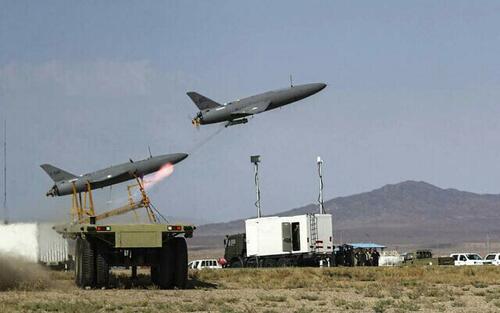
It cost Israel more than $1bn to activate its defense systems that intercepted Iran's massive drone and missile attack overnight, according to a former financial adviser to Israel's military.
"The defence tonight was on the order of 4-5bn shekels [$1-1.3bn] per night," estimated Brigadier General Reem Aminoach in an interview with Ynet news.

Aminoach highlighted that the staggering price tag stands in contrast to the relatively low amount that Iran had spent to launch its assault, which some estimates have put at less than 10 percent of what it cost Israel to stop the attack.
Iran launched more than 300 drones and missiles towards Israel on Saturday, in response to an Israeli attack on its consulate in Syria that killed two senior Revolutionary Guard commanders earlier this month.
Israel said its military forces and its allies had intercepted 99 percent of the missiles, but some ballistic missiles penetrated Israeli defences and hit the Nevatim Airbase in southern Israel.
"If we're talking about ballistic missiles that need to be brought down with an Arrow system, cruise missiles that need to be brought down with other missiles, and UAVs [unmanned aerial vehicles], which we actually bring down mainly with fighter jets," he said.
"Then add up the costs - $3.5m for an Arrow missile, $1m for a David's Sling, such and such costs for jets. An order of magnitude of 4-5bn shekels."
That's funny: US taxpayer dollars barely cover 60% of that fireworks show. The rest is all debt. https://t.co/LN7qESioSb
— zerohedge (@zerohedge) April 14, 2024
David's Sling is a weapons system meant to intercept medium to long-range rockets and missiles. The Arrow system was designed to thwart long-range missiles, including the types of ballistic missiles Iran launched on Saturday and of long-range missiles launched by the Houthis in Yemen.
It cost Israel more than $1bn to activate its defense systems that intercepted Iran’s massive drone and missile attack overnight, according to a former financial adviser to Israel’s military.
“The defence tonight was on the order of 4-5bn shekels [$1-1.3bn] per night,” estimated Brigadier General Reem Aminoach in an interview with Ynet news.

Aminoach highlighted that the staggering price tag stands in contrast to the relatively low amount that Iran had spent to launch its assault, which some estimates have put at less than 10 percent of what it cost Israel to stop the attack.
Iran launched more than 300 drones and missiles towards Israel on Saturday, in response to an Israeli attack on its consulate in Syria that killed two senior Revolutionary Guard commanders earlier this month.
Israel said its military forces and its allies had intercepted 99 percent of the missiles, but some ballistic missiles penetrated Israeli defences and hit the Nevatim Airbase in southern Israel.
“If we’re talking about ballistic missiles that need to be brought down with an Arrow system, cruise missiles that need to be brought down with other missiles, and UAVs [unmanned aerial vehicles], which we actually bring down mainly with fighter jets,” he said.
“Then add up the costs – $3.5m for an Arrow missile, $1m for a David’s Sling, such and such costs for jets. An order of magnitude of 4-5bn shekels.”
That’s funny: US taxpayer dollars barely cover 60% of that fireworks show. The rest is all debt. https://t.co/LN7qESioSb
— zerohedge (@zerohedge) April 14, 2024
David’s Sling is a weapons system meant to intercept medium to long-range rockets and missiles. The Arrow system was designed to thwart long-range missiles, including the types of ballistic missiles Iran launched on Saturday and of long-range missiles launched by the Houthis in Yemen.
Loading…





